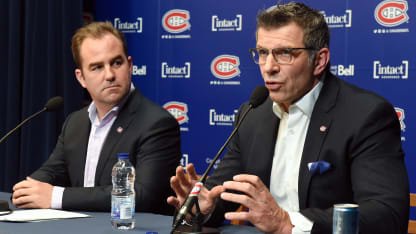As part of their evaluation, both Molson and the Habs' GM identified the lack of a winning attitude as the starting point for the club's return to success, with Bergevin pointing out several times that a similar result was likely even with different players if this season's mindset remained.
But there will be much more to do.
"I think attitude is certainly a part of it, but the real message is, we weren't good enough, we have to get better, and changes are coming so that we can get better. Our best players weren't at their best this year," added Molson, whose team finished third-last in the Eastern Conference with 71 points in the standings. "Whether it's that they don't fit anymore, or they fit and they can be better, or if a change of attitude is required… all of these things are part of the equation, but everyone needs to be better next year. It's not just the players; it's everyone in the whole organization. Marc and I are completely aligned in this. The time is now, and we have to get better."
As Bergevin reflected back, he acknowledged the problems manifested themselves early on, and getting back on track to salvage the campaign was, in retrospect, insurmountable.
"From the start of the season, from game one, if you talk about the regular season, we were never in the playoff race or position," he said of a Canadiens squad that lost six-straight games after winning their opening contest in October. "We were never in sync. I believe an attitude changes a lot of things. Of course, players make things better. But if you have good players without the right attitude, I can bring anybody here and if the attitude isn't better, we're going to be in the same spot. That's my job to address that. I've started today. We had meetings throughout the season, but now the real work starts."
That work starts with a realignment of the team's approach to the game, but will also involve a re-examination of how it connects to the fans.
"Sometimes, when we communicate, we just communicate that we've done something, but we don't give a little more color to it to make sure everyone really understands why we did it. Why did we call up a player? Why did we send him down the next morning? Why did we make the kind of decision we might have made? I think we have an opportunity to be a little bit more transparent there and to provide more information so our fans have a better understanding of why we're doing things," outlined Molson. "Overall, I think members of our executive hockey team can be more accessible and spend more time with you all discussing our season and whatever is wanted to be discussed."

